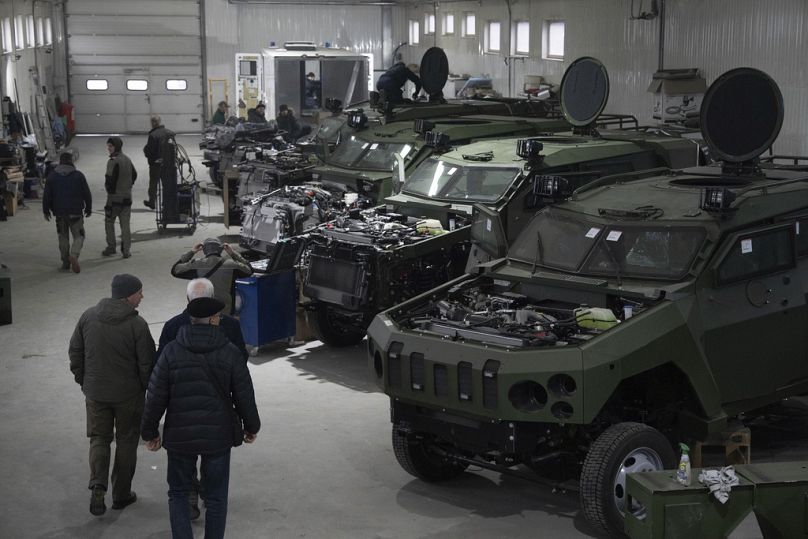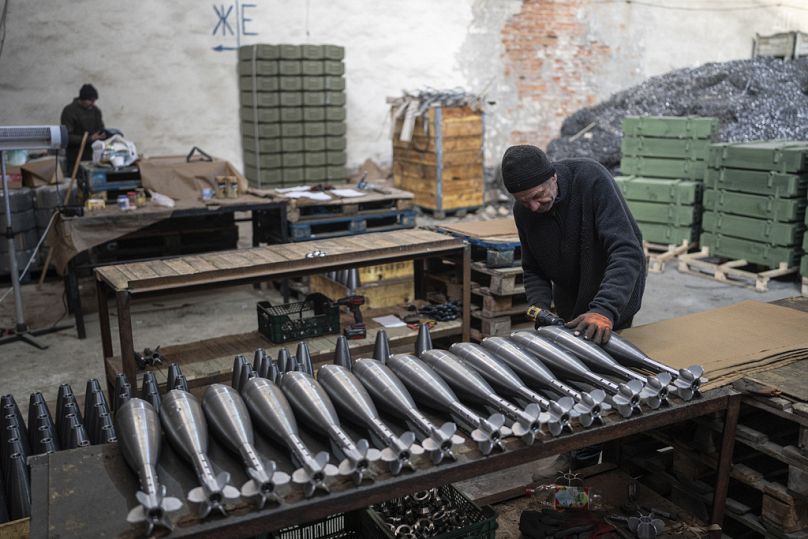Though the country's defence sector has transformed impressively, Ukraine stands no chance of defeating Russia without massive support from the West, according to experts.
Ukraine needs any edge it can get to repel Russia from its territory.
One bright spot is its small but fast-growing defence industry, which the government in Kyiv is flooding with money in the hopes that homemade weapons and ammunition can help turn the tide.
The effort ramped up sharply over the past year as the US and Europe strained to deliver weapons and other aid to Ukraine, which is up against a much bigger Russian military backed by a thriving domestic defence industry.
The Ukrainian government budgeted nearly $1.4 billion (€1.29 billion) in 2024 to buy and develop weapons at home - 20 times more than before Russia's full-scale invasion.
And in another major shift, a huge portion of weapons are now being bought from privately owned factories. They are sprouting up across the country and rapidly taking over an industry that had been dominated by state-owned companies.
A privately owned mortar factory that launched in western Ukraine last year is making roughly 20,000 shells a month.
“I feel that we are bringing our country closer to victory,” said Anatolli Kuzmin, the factory’s 64-year-old owner, who used to make farm equipment and fled his home in southern Ukraine after Russia invaded in 2022.
Yet like many aspects of Ukraine's war apparatus, its defence sector has been constrained by a lack of money and manpower – and, according to executives and generals, too much government red tape. A more robust private sector could help root out inefficiencies and enable factories to churn out weapons and ammunition even faster.
Stakes couldn't be higher
Russia controls nearly a quarter of Ukraine and has gained momentum along the 1,000-kilometre front line by showing a willingness to expend large numbers of troops to make even the smallest of advances. Ukrainian troops regularly find themselves outmanned and outgunned, and this has contributed to falling morale.
“You need a mortar not in three years, you need it now, preferably yesterday,” said Taras Chmut, director of the Come Back Alive Foundation, an organisation that has raised more than $260 million (€240 million) over the past decade to equip Ukrainian troops with machine guns, armoured vehicles and more.
Kuzmin, the owner of the mortar factory, fled the southern city of Melitopol in 2022 after Russia invaded and seized his factory that mostly made spare parts for farm equipment. He had begun developing a prototype for mortar shells shortly after Russia invaded Ukraine in 2014, when it illegally annexed the Crimean Peninsula.
He is just one of many entrepreneurs transforming Ukraine's weapons industry, which was dominated by state-owned enterprises after the break-up of the Soviet Union. Today, about 80 per cent of the defence industry is in private hands - a mirror image of where things stood a year ago and a stark contrast with Russia's state-controlled defence industry.
Obstacles to growth
Ukraine's surge in military spending has occurred against a backdrop of $60 billion in U.S. aid being held up by Congress and with European countries struggling to deliver enough ammunition.
As impressive as Ukraine's defence sector transformation has been, the country stands no chance of defeating Russia without massive support from the West, said Trevor Taylor, a research fellow at the Royal United Services Institute, a London-based think tank.
“Ukraine is not capable of producing all the munitions that it needs for this fight,” Taylor said. “The hold up of $60 billion of American help is really proving to be a significant hindrance.”
Russia is also pumping more money into its defence industry, whose growth has helped buffer its economy from the full brunt of Western sanctions. The country's defence minister, Sergei Shoigu, recently boasted of huge increases in the manufacture of tanks, drones and ammunition.
“The entire country has risen and is working for our victory,” he said.
Still, domestic weapons factories face a range of challenges - from keeping up with the changing needs of battlefield commanders, to their own vulnerability to long-range Russian missile strikes.
But perhaps the greatest immediate hindrance is a lack of manpower.
Yaroslav Dzera, who manages one of Ukrainian Armor's factories, said he struggles to recruit and keep qualified workers, not least because many of them have been mobilised to fight.
Russia's war in Ukraine is not a standoff over whose got better drones or missiles, said Serhii Pashynskyi, head of the National Association of Ukrainian Defense Industries trade group.
“We have a war of only two resources with Russia — manpower and money,” he said. “And if we learn to use these two basic resources, we will win. If not, we will have big problems.”













